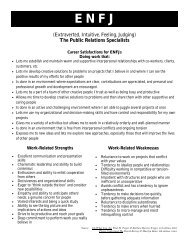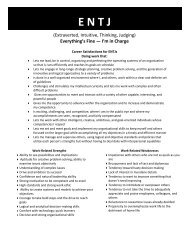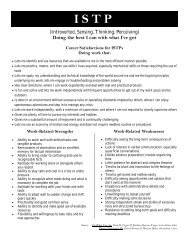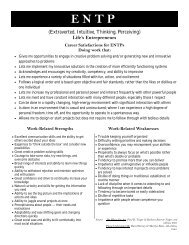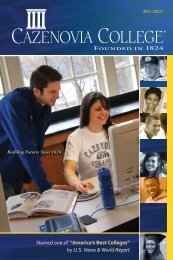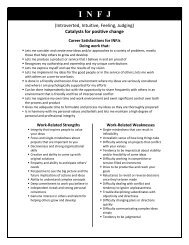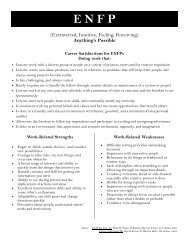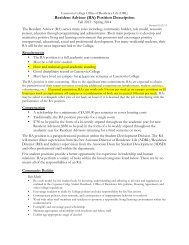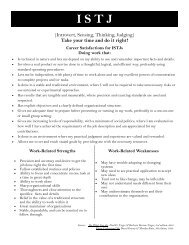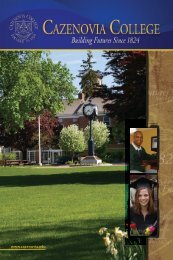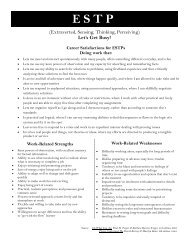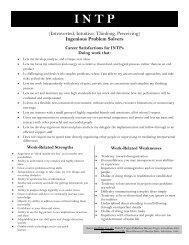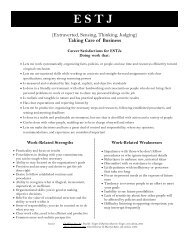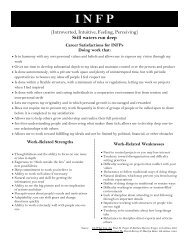of
2013-14 Academic Catalog - Cazenovia College
2013-14 Academic Catalog - Cazenovia College
- No tags were found...
Create successful ePaper yourself
Turn your PDF publications into a flip-book with our unique Google optimized e-Paper software.
EQ 204 Reining II<br />
2 credits (fulfills equitation requirement)<br />
Instruction includes all reining maneuvers, slow small and<br />
large fast circles, spins, lead changes, rollbacks, sliding stops<br />
and back-ups. These maneuvers are done in a specific order,<br />
which are called patterns. These patterns will be performed<br />
with a higher degree <strong>of</strong> competence (than in EQ104) by<br />
students at the end <strong>of</strong> the semester. The student will also<br />
gain further knowledge <strong>of</strong> the NRHA judging system. Riding<br />
theory, equipment usage, patterns and show ring procedures<br />
are included.<br />
A student may repeat this course once for credit. There is an<br />
additional fee for each course. (Offered annually)<br />
Prerequisite: Successful completion <strong>of</strong> two semesters <strong>of</strong> EQ 104.<br />
EQ 205 Pleasure Driving II<br />
2 credits (fulfills equitation requirement)<br />
Instruction includes further knowledge <strong>of</strong> the harness,<br />
carriage and hitching the driving horse, driving etiquette and<br />
safety, and development <strong>of</strong> competency and/or increasing<br />
competency in driving in both indoor and outdoor settings.<br />
Additional harness and vehicle types will be discussed. More<br />
advanced show driving, obstacle and cones driving as well as<br />
cross country driving practices and procedures are included.<br />
A student may repeat this course once for credit. There is an<br />
additional fee for each course. (Offered fall semester)<br />
Prerequisite: Successful completion <strong>of</strong> two semesters <strong>of</strong> EQ 105.<br />
EQ 220 Equine Nutrition<br />
4 credits (CS/AS)<br />
Students study the theoretical and practical aspects associated<br />
with the science and art <strong>of</strong> equine nutrition. The topics <strong>of</strong><br />
digestive anatomy and physiology are reviewed; classes <strong>of</strong><br />
nutrients and feeds in which they are contained are discussed<br />
and the relationship between quality feeds and top<br />
performance is explored. Also included: feeding various<br />
classes <strong>of</strong> horses and current topics in equine nutrition. A<br />
weekly laboratory session provides time for forage and<br />
concentrate identification along with studying techniques <strong>of</strong><br />
ration analysis. Nutritional disorders are covered along with<br />
the relationship between nutrition and proper conditioning.<br />
(Offered spring term)<br />
EQ 223 Competitive Horse Judging<br />
1 credit (CS)<br />
Students further develop skills learned in EQ 121 Equine<br />
Selection, Improvement, Judging. This is accomplished<br />
through horse judging practices, as well as formal<br />
competition. Students enrolling during the fall term will<br />
compete in the All American Quarter Horse Congress<br />
Judging Contest while students enrolling during the spring<br />
term will compete in the Intercollegiate Horse Show<br />
Association Judging Contest. Students may enroll more than<br />
once for credit. (Offered on a rotating basis)<br />
EQ 230 Concepts and Methods in Horse Training<br />
3 credits (CS)<br />
This course is concerned with the theory and techniques <strong>of</strong><br />
schooling young or problem horses to ride and drive. Various<br />
methods and procedures are covered, and students are given<br />
the opportunity to apply them. Emphasis is placed on<br />
understanding horses’ behavior as it relates to humane care<br />
and training. The psychology <strong>of</strong> the horse is studied. Proper<br />
use <strong>of</strong> equipment is stressed in actual practice. (Offered fall<br />
term) Prerequisite: EQ 110 Introduction to Equine Studies<br />
and at least one riding course<br />
EQ 241 Theory and Methods <strong>of</strong> Equitation Instruction I<br />
3 credits (CS)<br />
Students examine the theories behind the various riding<br />
techniques. They study methods <strong>of</strong> effective teaching,<br />
including ways <strong>of</strong> dealing with riders who differ in their<br />
abilities, age, experience and comfort level. They learn how to<br />
organize and present a lesson. Students observe actual<br />
teaching and training sessions with several industry<br />
pr<strong>of</strong>essionals. They discuss objectives and methods with the<br />
instructor. When ready, students assume the role <strong>of</strong> instructor<br />
with responsibility (under appropriate supervision) for the<br />
instruction <strong>of</strong> other students. (Offered alternate year fall<br />
term) Prerequisite: at least one riding class<br />
EQ 242 Theory and Methods <strong>of</strong> Equitation Instruction<br />
II<br />
3 credits (CS)<br />
A continuation <strong>of</strong> EQ 241 Theory and Methods <strong>of</strong><br />
Equitation Instruction I. Students complete independent<br />
student teaching assignments and continue to learn more<br />
advanced teaching and training techniques. Riding Instructor<br />
Certification Programs are discussed and the American<br />
Riding Instructor’s Certification Program (ARICP) is studied<br />
in depth. Students are given the opportunity to become<br />
certified through the ARICP toward the end <strong>of</strong> the semester<br />
when the testing is <strong>of</strong>fered at Cazenovia College. (Offered<br />
alternate year spring term) Prerequisite: EQ 241 Theory and<br />
Methods <strong>of</strong> Equitation Instruction I<br />
EQ 265 Horse Show Management<br />
3 credits (CS)<br />
Students learn the mechanics <strong>of</strong> planning and managing a<br />
horse show. They become familiar with the U.S. Equestrian<br />
Federation (USEF) rulebook and the principles <strong>of</strong> judging.<br />
Students will learn the roles <strong>of</strong> manager, secretary, treasurer,<br />
ring steward, announcer, course designer, jump crew and<br />
paddock master. All methods <strong>of</strong> managing a successful horse<br />
show will be examined. Other equine events including clinics,<br />
horse trials and open houses are discussed. The class<br />
sponsors and organizes a horse show. (Offered alternate year<br />
spring term)<br />
EQ 270 Equine Photography<br />
3 credits (CS)<br />
This course focuses on basic photographic techniques using<br />
the horse as a subject. Emphasis is placed on correct<br />
techniques for halter and performance horse photography for<br />
use in promotion and sales. A variety <strong>of</strong> photographic<br />
imaging – from conventional to digital – may be covered. The<br />
course does not involve darkroom work. Students must be<br />
prepared to incur costs <strong>of</strong> an appropriate digital camera and<br />
mounting <strong>of</strong> final project pieces. (Offered fall term)<br />
Academic Catalog | Cazenovia College | www.cazenovia.edu 155



